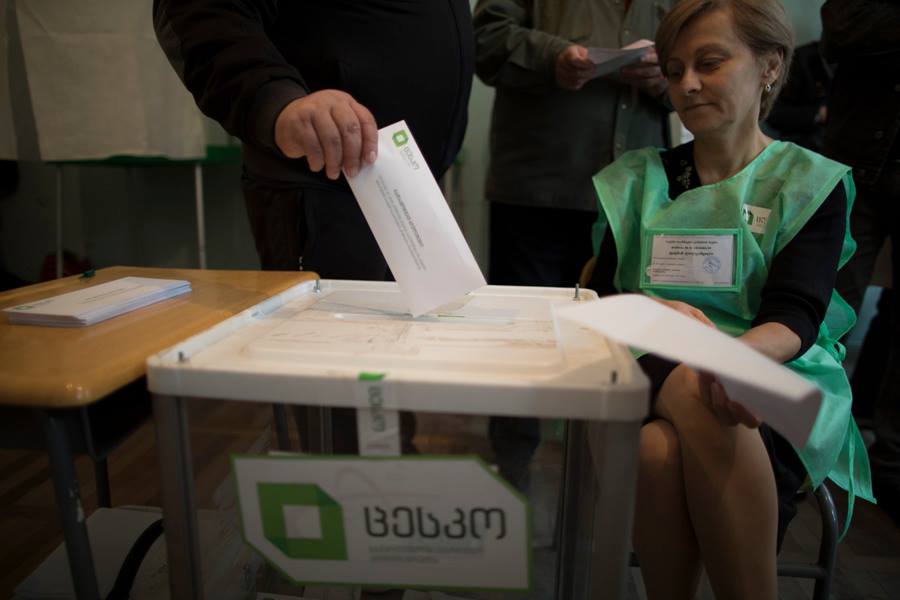
Georgian Parliament Endorses Changes to Electoral Code in Final Reading
With 94 votes in favor and one against, Parliament of Georgia endorsed the proposed changes to the Election Code in its third and final reading on July 2, aimed to comply the legislation with the OSCE/ODIHR recommendations. Opposition European Georgia and United National Movement parties remain on boycott and did not participate in the voting.
The draft law was initiated by Speaker Archil Talakvadze and other ruling Georgian Dream party MPs – Irakli Kobakhizde, Anri Okhanashvili, and Davit Matikashvili.
MP Kobakhidze stated yesterday that with the new electoral system, Georgia now ensures “comprehensive review of the election legislation” as recommended by the OSCE/ODIHR, aimed to holding upcoming parliamentary polls “in an unprecedented fair and free environment.”
Importantly, the amendments bar central and local government bodies from airing ads over the undertaken or planned works for the period of 60 days ahead of the polling day.
The employees of the non-commercial and legal entities founded by the central or local government bodies are banned from election agitating during the working hours.
The amendments also introduce the so called 25% gender quotas, meaning that in their proportional party list the political parties are obliged to include at least every fourth person of a different gender. With 120 MPs elected through proportional vote in Georgia’s next 150-member Parliament, the amendment should raise the female representation in the legislative body at least to 30 MPs (20% of the overall number).
The said rule will apply to the parliamentary polls through October 2024 elections and following snap polls until October 2028 elections. Starting from October 2028 polls until October 2032 elections, however, the party lists should include at least every third person of a different gender.
Some of the other changes include setting the exact date for the runoff (third Saturday after the first round Election Day). The amendments prohibit posing other obstacles to arriving voters within 25 meters of a polling station on Election Day.
Moreover, political parties surpassing 3% threshold shall be eligible for free airtime. Violation of rules of publication of election-related opinion polls shall be a subject to GEL 5,000 fine imposed on national broadcasters and GEL 1,500 fine imposed on other broadcasters.
Failure to comply with the statutory obligation to submit a report for election campaign fund and/or submitting a report for election campaign fund with inaccurate data shall be subject to a warning or GEL 1,000 (USD 320) fine imposed on an independent candidate and GEL 5,000 (USD 1,645) fine imposed on a political party.
In the meantime, a political party that receives at least 1% of the votes cast shall be eligible to state funding; a party shall received GEL 15 for each vote above 50,000, and GEL 5 for each following vote annually.
The Georgian Young Lawyers Association (GYLA), a local watchdog, said in its assessment of July 1 that the draft law needed further improvement to comply with the ODIHR recommendations.
Speaking of staffing of the electoral administration, the CSO said changes maintain the existing system that serves to strengthen the ruling party’s position in the electoral administration.
EU Ambassador to Georgia Carl Hartzell has welcomed “the legislative improvements” made in line with OSCE/ODIHR recommendations.” He added however that he would have hoped to see “more ambitious reforms, including in key areas recommended by OSCE/ODIHR such as voter intimidation, dispute resolution and commission compositions.”
My remarks on yesterday´s adoption of the election reform package
➡️ https://t.co/owyj3pWlnS pic.twitter.com/PBvj5ktZEq
— Carl Hartzell (@CarlHartzellEU) July 3, 2020
Regretting that the “opportunity was missed to win a broader political support behind the new election legislation,” Carl Hartzell said the upcoming parliamentary elections will be “a pivotal moment to assess Georgia’s commitment to upholding democratic processes and the rule of law.”
Read also:
- Parliament Endorses Changes to Electoral Code in First Reading
- Georgian Parliament Passes Constitutional Changes on Electoral Reform
- OSCE/ODIHR on Opposition-proposed Amendments to Georgia’s Election Code
- CSOs: “Working on Electoral Reform Should Continue”
- Parliament Speaker Meets Opposition, CSOs to Discuss Electoral Reform
This post is also available in: ქართული Русский